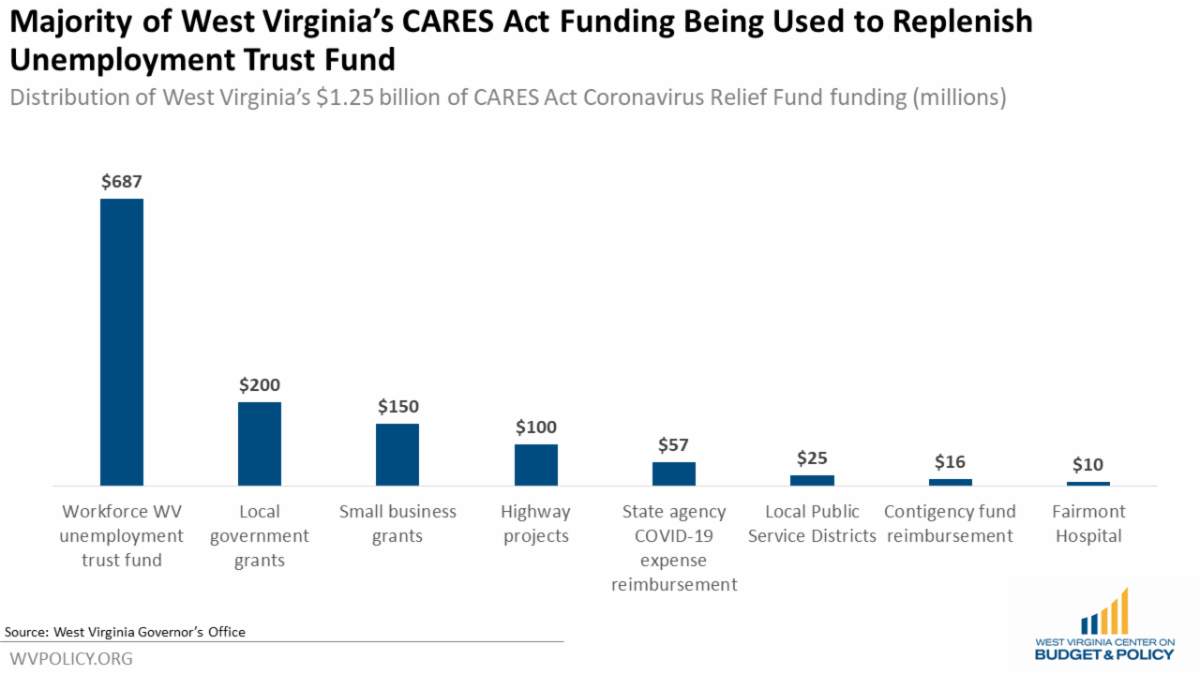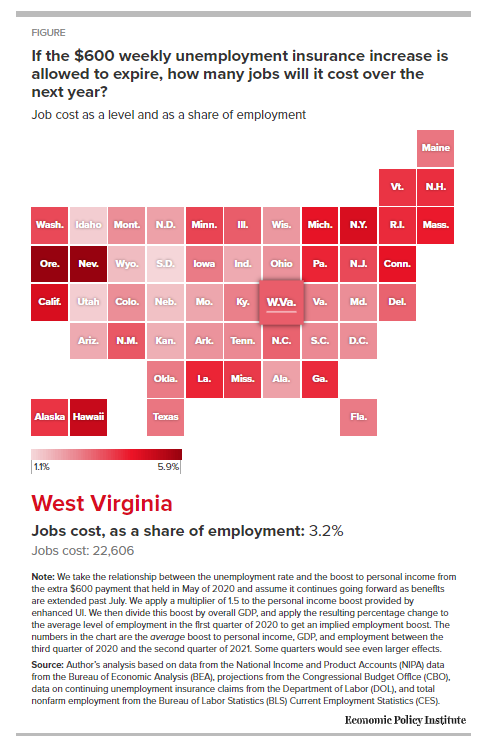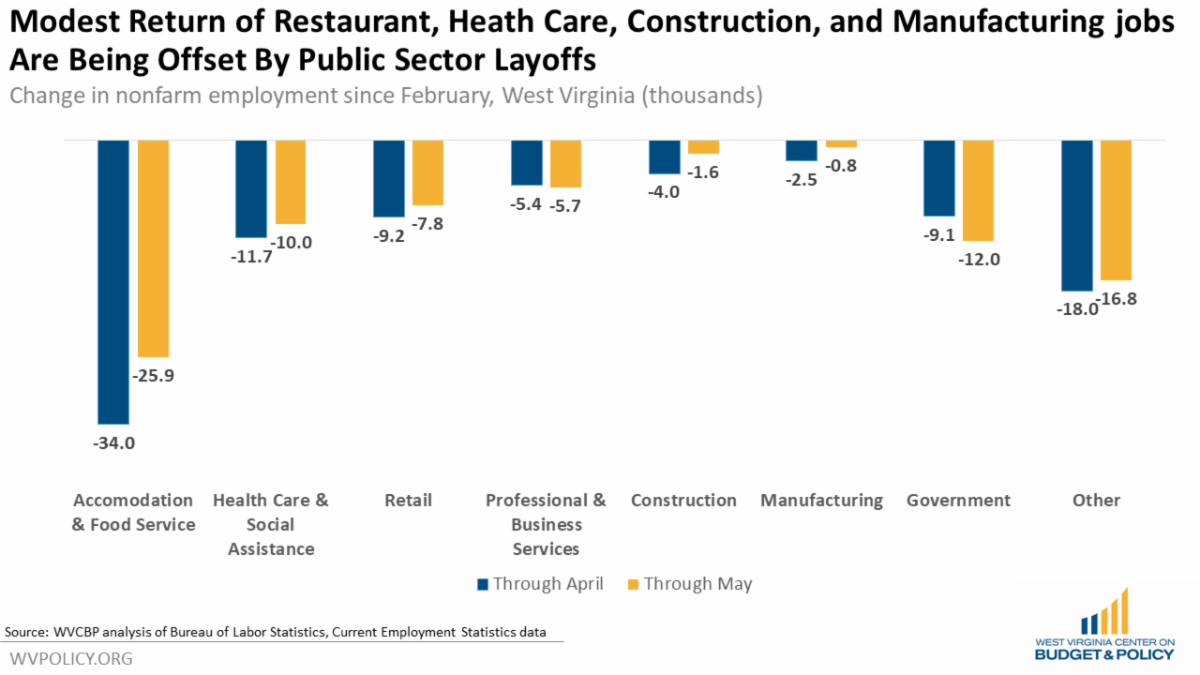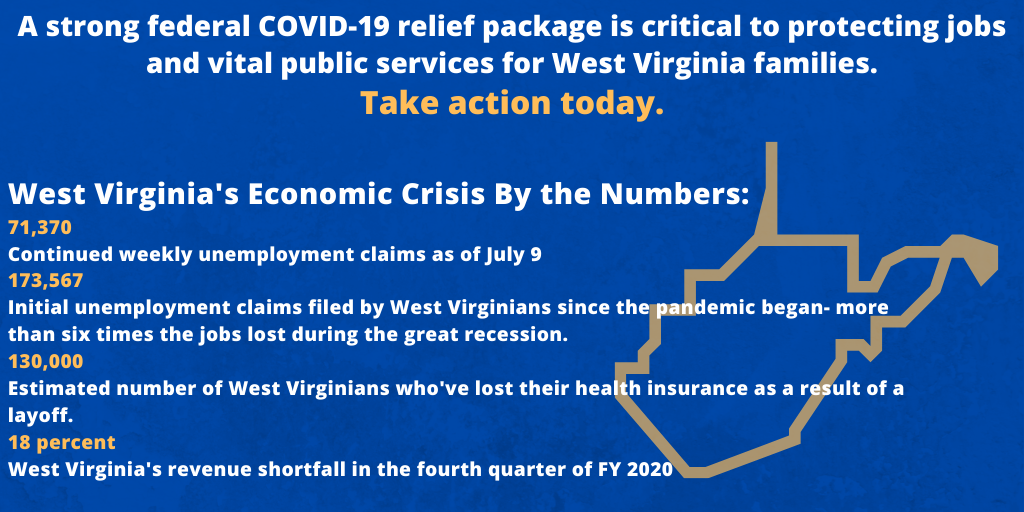Last month, Governor Justice unveiled his plan for using the $1.25 billion in CARES Act funding that West Virginia received to help the state respond to the COVID-19 pandemic.
Treasury Department guidance forbids states from using the funds to offset revenue losses due to the pandemic, limiting what states can do with the funding. This is unfortunate, as West Virginia ended FY 2020 with a $198 million revenue shortfall, and is likely to see more shortfalls in the coming fiscal year as the impact of the COVID-19 crisis continues to be felt.
With those limitations, Governor Justice has chosen to allocate funding to local governments, grants for small businesses, and highway projects, as well as smaller allotments to Fairmont State Hospital, local public service districts, and various state reimbursements. However, the majority of the $1.25 billion in CARES Act funding is going to Workforce West Virginia, in order to replenish the state’s unemployment trust fund system.
West Virginia currently has more urgent needs than avoiding having to repay federal unemployment trust fund loans two years from now, including ensuring schools are safe to open, funding any changes that need to be made in education, increasing testing capacity, providing PPE, and supporting child care infrastructure. The state should maximize its CARES Act funding to meet those needs.
Read Sean’s full blog post here.

Included in the CARES Act was a federal unemployment benefit of an additional $600 per week, originally scheduled to expire on July 31. While there is discussion of extending this federal benefit, the boost’s future remains uncertain.
Senior Policy Analyst Sean O’Leary was featured in a recent Huntington Herald-Dispatch article where he expressed concern about the potential end of the additional payment. He stated:
“That is going to be a major shock to the economy and to the people who are receiving it. There’s more than 80,000 workers in West Virginia collecting unemployment, which is far beyond even what we saw during the Great Recession. It would take months and months of really solid growth to get jobs for all of those people, and that’s assuming no more workers get added on.”
“We also have a pretty good idea that it is largely low-wage workers who have lost jobs and are collecting unemployment. Demographically, women, Black workers and younger workers have been disproportionately affected, and those demos are typically over-represented in low-wage jobs.”
“The July 31 expiration is just an arbitrary date and doesn’t reflect actual economic conditions. These are people who lost their jobs through no fault of their own. It’s going to take a long time to get the economy back to where it was, and while things are still uncertain, those supports are very important.”
Our partners at the Economic Policy Institute calculated expected job losses over the next year if the US Senate does not take action to extend the federal compensation beyond its current scheduled July expiration.
View their map here.

West Virginia added 13,300 jobs in May, welcome news after losing 92,000 jobs in April as the state struggled with the economic impact of the COVID-19 pandemic. However, as food service, health care, and other private sector jobs saw modest gains after April’s massive losses, state and local government jobs continued to decline, partially offsetting the private sector’s gains.
West Virginia lost 13.0 percent of its total nonfarm jobs in April, with women, Black, and young workers hit particularly hard. As the state began to reopen in May, some workers were able to go back to work, but not all. West Virginia has gained back only 14.1 percent of the jobs it lost since February.
Read Sean’s full blog post.

In March, the West Virginia Public Service Commission banned utility shutoffs due to the pandemic-related unemployment spike and accompanying financial hardship experienced by many. Last week, this ban expired, meaning that those unable to pay their utility bills are now at risk of having their services disconnected.
Policy Outreach Director Seth DiStefano says the end of the utilities cutoff ban is cause for alarm. He is quoted in last week’s Public News Servicearticle saying:
“What we’re going to have here is, you know, in addition to skyrocketing food insecurity, you know, in addition to people being worried about just simply putting food on the table, they very well may not have water to boil for dinner, or even wash their hands or do laundry.”
He warns that the end of the $600 weekly federal unemployment benefit would further exacerbate people’s struggles.
Seth urges those facing financial hardship to contact their service providers, as some are open to establishing payback plans with clients. He also encourages folks to reach out to their members of Congress, asking them to advocate for extended unemployment benefits and increased support for programs such as Medicaid and SNAP as a way to mitigate COVID-19-related harm.

The next few weeks are critical for West Virginia. Please join us in urging Sens. Shelley Moore Capito and Joe Manchin to continue their support of West Virginia’s workers and families during the COVID-19 crisis and throughout our economic recovery.
Sign the petition here.

For more information on the impact of the pandemic on West Virginia’s economy, safety net, unemployment resources, and more, please visit our special website page.
